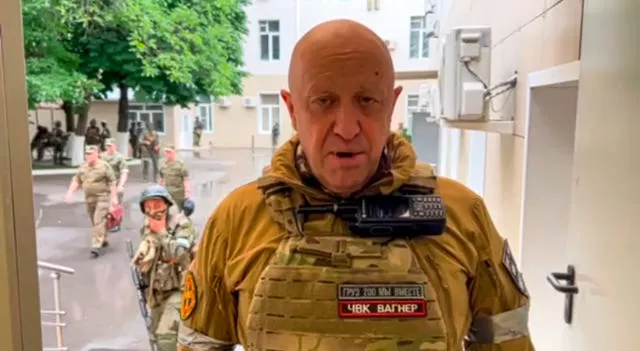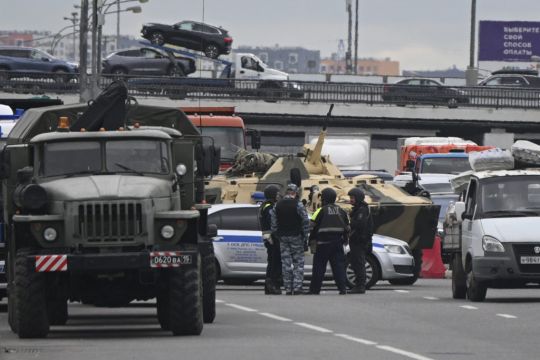Checkpoints with armoured vehicles have been set up and Moscow’s mayor urged motorists to stay off roads as the Russian capital braced for the arrival of a private army led by a rebellious mercenary commander.
Russian president Vladimir Putin vowed harsh consequences for organisers of the armed uprising led by his former protege, Yevgeny Prigozhin, who brought his forces out of Ukraine, seized a key military facility in southern Russia and advanced towards Moscow.
Mr Prigozhin’s actions represented the most significant challenge to Mr Putin’s leadership in his more than two decades in power.
In a televised speech to the nation, Mr Putin called the rebellion a “betrayal” and “treason”.
“All those who prepared the rebellion will suffer inevitable punishment,” Mr Putin said. “The armed forces and other government agencies have received the necessary orders.”
Authorities declared a “counter-terrorist regime” in the capital and its surrounding region, enhancing security and restricting some movement.
On the southern outskirts, troops erected checkpoints, arranged sandbags and set up machine guns.
Moscow mayor Sergei Sobyanin warned that traffic could be restricted in parts of the capital. He declared Monday a non-working day for most residents.
Crews dug up sections of highways to slow the movement of the Wagner mercenary army. Access to Red Square was closed, two major museums were evacuated and a park was shut.

Mr Prigozhin’s private army appeared to control the military headquarters in Rostov-on-Don, a city 660 miles south of Moscow that runs Russian operations in Ukraine, the UK’s Ministry of Defence said.
Wagner troops and equipment were also in Lipetsk province, about 225 miles south of Moscow, where authorities “are taking all necessary measures to ensure the safety of the population”, said regional governor Igor Artamonov, via Telegram.
The dramatic developments came exactly 16 months after Russia launched its full-scale invasion of Ukraine that has killed tens of thousands, displaced millions and reduced cities to rubble.
Ukrainians hoped the Russian infighting would create opportunities for its army to take back territory seized by Russian forces.
💬 #Putin: Today, Russia is waging a tough struggle for its future, repelling the aggression of neo-Nazis & their patrons.
❗️ Any internal revolt is a deadly threat to our statehood. Our actions to defend the Fatherland from this threat will be harsh.
🔗https://t.co/I2zLIcLKAB pic.twitter.com/pUHycm0KFx— MFA Russia 🇷🇺 (@mfa_russia) June 24, 2023
Ukrainian president Volodymyr Zelenskiy said Moscow was suffering “full-scale weakness” and that Kyiv was protecting Europe from “the spread of Russian evil and chaos”.
The Federal Security Service, or FSB, called for Mr Prigozhin’s arrest on Friday night after he declared the armed rebellion.
Mr Prigozhin said his fighters would not surrender, as “we do not want the country to live on in corruption, deceit and bureaucracy”.
“Regarding the betrayal of the motherland, the president was deeply mistaken. We are patriots of our homeland,” he said in an audio message on his Telegram channel.

Mr Prigozhin’s private army has been fighting alongside regular Russian troops in Ukraine. His goals were not immediately clear but the rebellion marks an escalation in his struggle with Russian military leaders, whom he accused of botching the war in Ukraine and hobbling his forces in the field.
“This is not a military coup, but a march of justice,” Mr Prigozhin said.
He said he had 25,000 troops under his command and urged the army not to offer resistance.
He posted video of himself at the military headquarters in Rostov-on-Don and claimed his forces had taken control of the airfield and other military facilities in the city. Other videos on social media showed military vehicles, including tanks, on the streets.
“We didn’t kill a single person on our way,” Mr Prigozhin said in one of his several messages posted as the day went on, adding that his forces seized the military headquarters “without a single gunshot”.

The rebellion comes as Russia is “fighting the toughest battle for its future”, Mr Putin said, with the West piling sanctions on Moscow and arming Ukraine.
“The entire military, economic and information machine of the West is waged against us,” Mr Putin said.
A Muscovite who gave only his first name of Khachik called the situation “scary”.
State-controlled TV networks led their news broadcasts with Mr Putin’s statement and reported the tense situation in Rostov-on-Don. Some showed social media videos of residents denouncing Wagner troops.

Broadcasters also carried statements from top officials and lawmakers voicing support for Mr Putin and condemning Mr Prigozhin.
In announcing the rebellion, Mr Prigozhin said he wanted to punish Defence Minister Sergei Shoigu after he accused Russian government forces of attacking Wagner field camps in Ukraine with rockets, helicopter gunships and artillery.
He claimed that “a huge number of our comrades got killed”.
Mr Prigozhin said his forces shot down a Russian military helicopter that fired on a civilian convoy.
He alleged that General Valery Gerasimov, chief of the General Staff, ordered the attacks following a meeting with Mr Shoigu, where they decided to destroy the military contractor.
Latest Defence Intelligence update on the situation in Ukraine - 24 June 2023.
Find out more about Defence Intelligence's use of language: https://t.co/K6An5jd2B8
🇺🇦 #StandWithUkraine 🇺🇦 pic.twitter.com/M3E5L0EHLB— Ministry of Defence 🇬🇧 (@DefenceHQ) June 24, 2023
The Defence Ministry denied attacking the Wagner camps.
Mr Prigozhin, 62, a former convict, has long ties to the Russian leader and won lucrative Kremlin catering contracts that earned him the nickname “Putin’s chef”.
He gained attention in the US when he and a dozen other Russian nationals were charged with operating a covert social media campaign aimed at fomenting discord ahead of Donald Trump’s 2016 presidential election victory.
He formed the Wagner mercenary group, which sent military contractors to Libya, Syria, several African countries and eventually Ukraine.
After Mr Putin’s address, in which he called for unity, officials sought to reiterate their allegiance to the Kremlin and urged Mr Prigozhin to back down.
Vyacheslav Volodin, speaker of the lower house of parliament, said lawmakers “stand for the consolidation of forces″ and support Mr Putin.
Foreign Ministry spokeswoman Maria Zakharova echoed that, saying in a Telegram post that “we have one commander in chief. Not two, not three. One″.

Ramzan Kadyrov, the strongman leader of the Chechnya region who used to side with Mr Prigozhin in his criticism of the military, also expressed his full support of Mr Putin’s “every word”.
“The mutiny needs to be suppressed,” Mr Kadyrov said.
While the outcome of the confrontation was still unclear, it appeared likely to further hinder Moscow’s war effort as Kyiv’s forces probed Russian defences in the initial stages of a counteroffensive.
Wagner forces have played a crucial role, capturing the eastern city of Bakhmut, an area where the bloodiest and longest battles have taken place. But Mr Prigozhin has increasingly criticized the military brass, accusing it of incompetence and of starving his troops of munitions.
Mr Zelenskiy noted the rebellion in his Telegram channel and said “anyone who chooses the path of evil destroys himself”.
“For a long time, Russia used propaganda to mask its weakness and the stupidity of its government. And now there is so much chaos that no lie can hide it,” he said.







